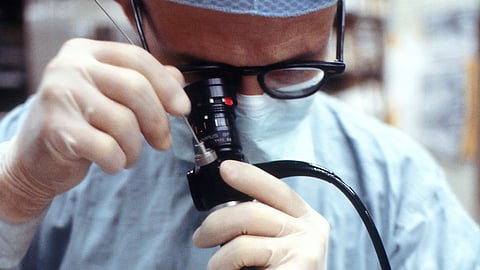An endoscopy OCT essentially shines a light in the colon to help a clinician see deeper to visualize and diagnose abnormalities. By collaborating with physicians at Washington University School of Medicine and with Chao Zhou, associate professor of biomedical engineering, the team developed a small OCT catheter, which uses a longer wavelength of light, to penetrate 1-2 mm into the tissue samples.
Hongbo Luo, a PhD student in Zhu’s lab, led the work.
The technique provided more information about an abnormality than surface-level, white-light images currently used by physicians. Shuying Li, a biomedical engineering PhD student, used the imaging data to train a machine learning algorithm to differentiate between “normal” and “cancerous” tissue. The combined system allowed them to detect and classify cancerous tissue samples with a 93% diagnostic accuracy.


